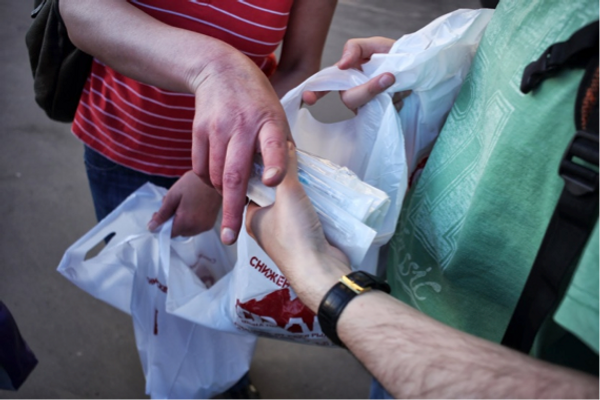Harm reduction in Moscow: Successes and challenges
“We began outreach at 7:30pm. As always, it was cold and windy in the outreach area. Right away, a guy came up smiling and asked for alcohol swabs and a pack of insulin syringes. Those who came later weren’t so modest. Everybody wanted ointments, but we had little of them. Once they asked me for condoms and lamented that we didn’t have Contex – we only had something called “Love”. Anyway, they took those. Three people asked about naloxone with two of them telling us how it had helped them save people from overdoses – three people saved at once. They asked for our contact details to get some consultations on treatment, including for HIV. One girl talked to Max for a long time telling him about her tribulations with treatment and drug clinics; he gave her some advice. Overall we had about 15 people approach us this time. In general, in spite of the foul weather outreach work went well…”
This is a description of a regular workday of the Harm Reduction Moscow project’s outreach team. The project is implemented by the Andrey Rylkov Foundation. The goal of this project is to help people using injectable drugs - who for various reasons are not ready to quit immediately- reduce all kinds of harmful consequences of drug use such as overdoses or vein problems. It helps them obtain necessary health and social support to impact the spread of infectious diseases such as hepatitis C and HIV infection. Our outreach teams work practically every day in various areas of the city. Our services are in great demand – just in the period between July 1 and December 31, 2013, 938 requests for services were registered. However, the project can cover only a small part of those who need its services in a mega-city. And unfortunately there are few such projects in Russia. They are usually implemented by non-governmental and non-profit organizations (NGOS), while the government does not support them at all.
The Andrey Rylkov Foundation for Health and Social Justice (or ARF) was established in June 2009. Its mission is to promote and develop humane drug policy based on tolerance, protection of health, dignity and human rights. The Foundation’s activities rely on voluntary support from representatives of the drug users’ community in the implementation of its projects. Through their involvement the Foundation builds the PUD community’s capacity to engage in advocacy and service provision.
Read the full article.
Keep up-to-date with drug policy developments by subscribing to the IDPC Monthly Alert.
This is a description of a regular workday of the Harm Reduction Moscow project’s outreach team. The project is implemented by the Andrey Rylkov Foundation. The goal of this project is to help people using injectable drugs - who for various reasons are not ready to quit immediately- reduce all kinds of harmful consequences of drug use such as overdoses or vein problems. It helps them obtain necessary health and social support to impact the spread of infectious diseases such as hepatitis C and HIV infection. Our outreach teams work practically every day in various areas of the city. Our services are in great demand – just in the period between July 1 and December 31, 2013, 938 requests for services were registered. However, the project can cover only a small part of those who need its services in a mega-city. And unfortunately there are few such projects in Russia. They are usually implemented by non-governmental and non-profit organizations (NGOS), while the government does not support them at all.
The Andrey Rylkov Foundation for Health and Social Justice (or ARF) was established in June 2009. Its mission is to promote and develop humane drug policy based on tolerance, protection of health, dignity and human rights. The Foundation’s activities rely on voluntary support from representatives of the drug users’ community in the implementation of its projects. Through their involvement the Foundation builds the PUD community’s capacity to engage in advocacy and service provision.
- See more at: http://hivadvocates.net/advocacy-stories/harm-reduction-moscow-successes-and-challenges#sthash.rSRbCcsp.dpuf“We began outreach at 7:30pm. As always, it was cold and windy in the outreach area. Right away, a guy came up smiling and asked for alcohol swabs and a pack of insulin syringes. Those who came later weren’t so modest. Everybody wanted ointments, but we had little of them. Once they asked me for condoms and lamented that we didn’t have Contex – we only had something called “Love”. Anyway, they took those. Three people asked about naloxone with two of them telling us how it had helped them save people from overdoses – three people saved at once. They asked for our contact details to get some consultations on treatment, including for HIV. One girl talked to Max for a long time telling him about her tribulations with treatment and drug clinics; he gave her some advice. Overall we had about 15 people approach us this time. In general, in spite of the foul weather outreach work went well…” - See more at: http://hivadvocates.net/advocacy-stories/harm-reduction-moscow-successes-and-challenges#sthash.rSRbCcsp.dpuf
